P5 Characteristic traits and skills of successful entrepreneurs
VerifiedAdded on 2021/02/19
|13
|4020
|29
AI Summary
Contribute Materials
Your contribution can guide someone’s learning journey. Share your
documents today.
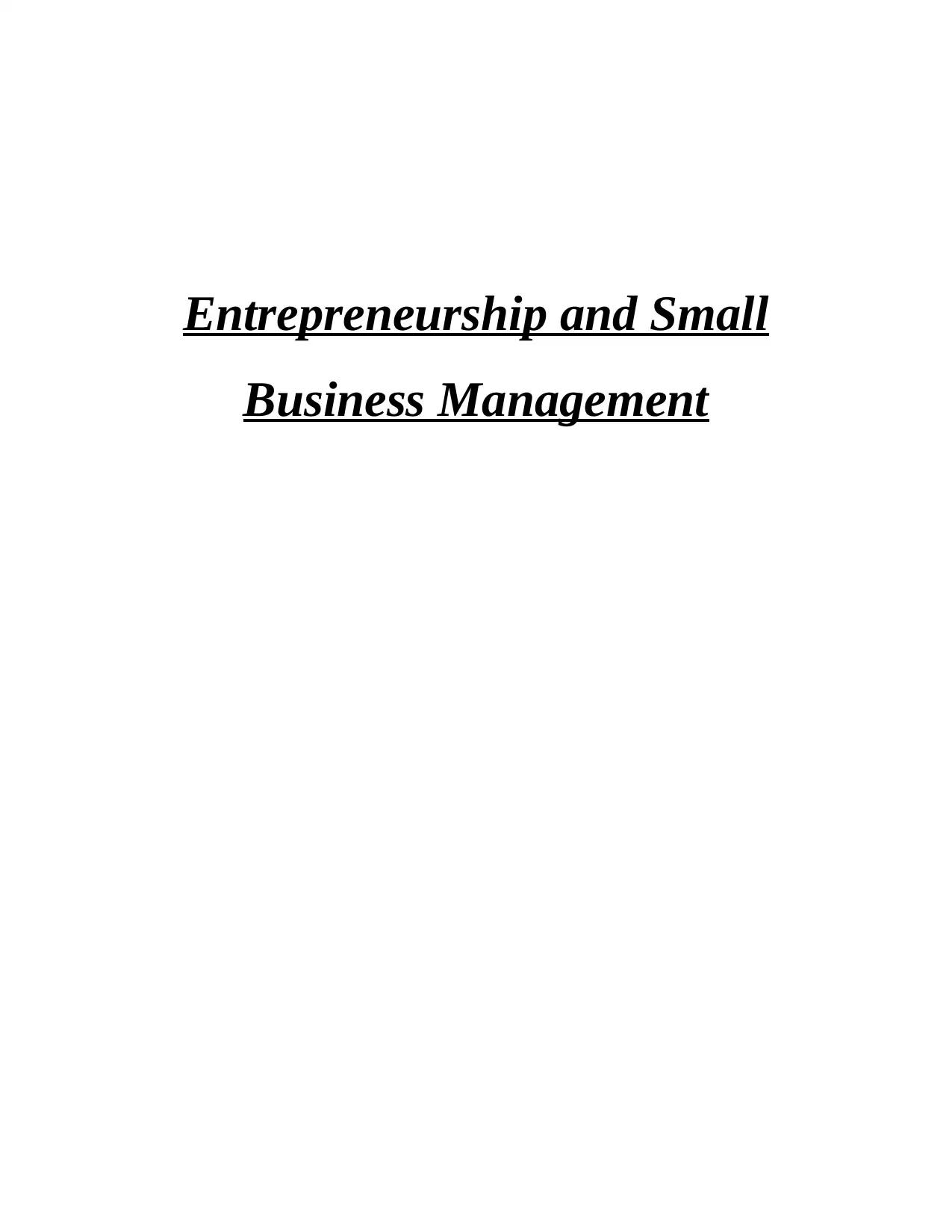
Entrepreneurship and Small
Business Management
Business Management
Secure Best Marks with AI Grader
Need help grading? Try our AI Grader for instant feedback on your assignments.
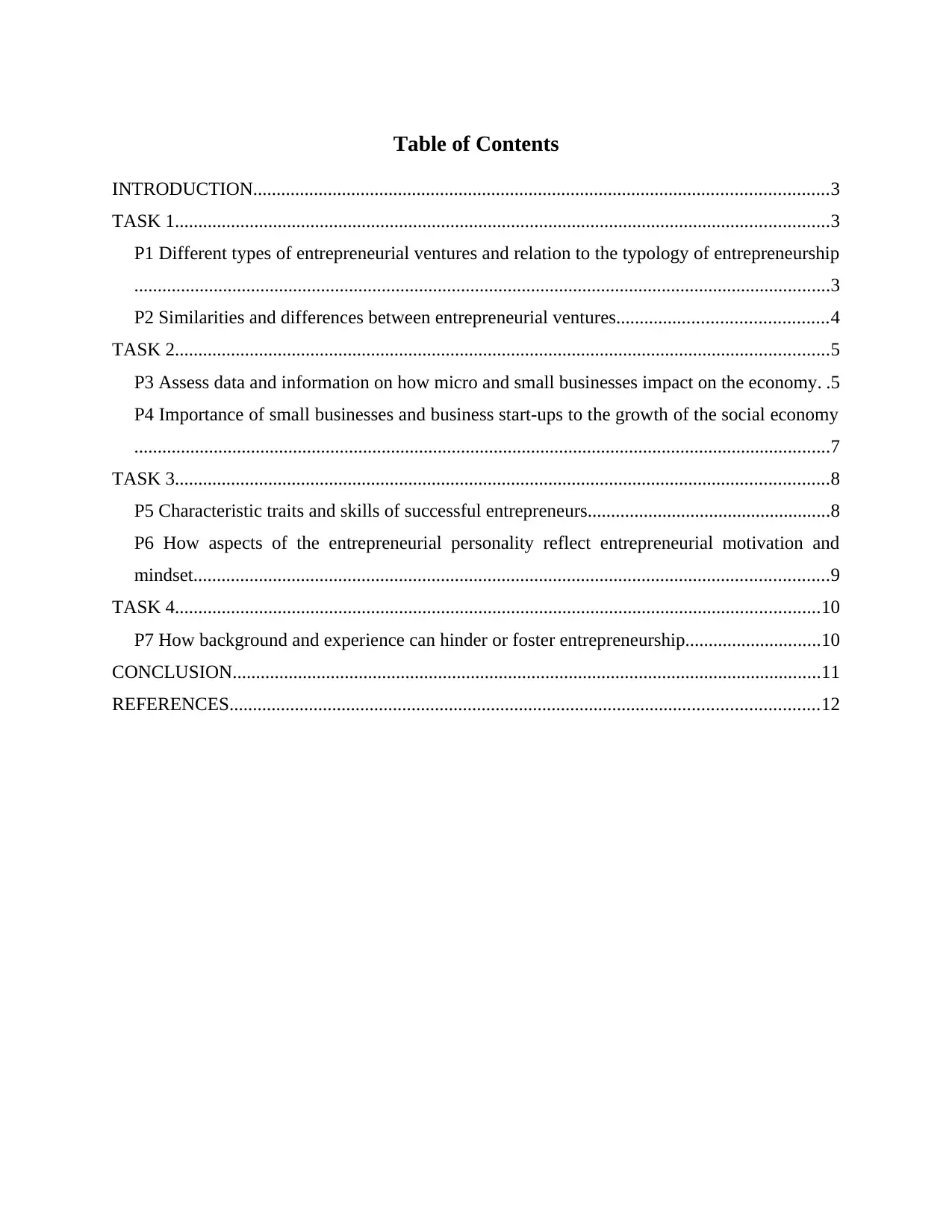
Table of Contents
INTRODUCTION...........................................................................................................................3
TASK 1............................................................................................................................................3
P1 Different types of entrepreneurial ventures and relation to the typology of entrepreneurship
.....................................................................................................................................................3
P2 Similarities and differences between entrepreneurial ventures.............................................4
TASK 2............................................................................................................................................5
P3 Assess data and information on how micro and small businesses impact on the economy. .5
P4 Importance of small businesses and business start-ups to the growth of the social economy
.....................................................................................................................................................7
TASK 3............................................................................................................................................8
P5 Characteristic traits and skills of successful entrepreneurs....................................................8
P6 How aspects of the entrepreneurial personality reflect entrepreneurial motivation and
mindset........................................................................................................................................9
TASK 4..........................................................................................................................................10
P7 How background and experience can hinder or foster entrepreneurship.............................10
CONCLUSION..............................................................................................................................11
REFERENCES..............................................................................................................................12
INTRODUCTION...........................................................................................................................3
TASK 1............................................................................................................................................3
P1 Different types of entrepreneurial ventures and relation to the typology of entrepreneurship
.....................................................................................................................................................3
P2 Similarities and differences between entrepreneurial ventures.............................................4
TASK 2............................................................................................................................................5
P3 Assess data and information on how micro and small businesses impact on the economy. .5
P4 Importance of small businesses and business start-ups to the growth of the social economy
.....................................................................................................................................................7
TASK 3............................................................................................................................................8
P5 Characteristic traits and skills of successful entrepreneurs....................................................8
P6 How aspects of the entrepreneurial personality reflect entrepreneurial motivation and
mindset........................................................................................................................................9
TASK 4..........................................................................................................................................10
P7 How background and experience can hinder or foster entrepreneurship.............................10
CONCLUSION..............................................................................................................................11
REFERENCES..............................................................................................................................12
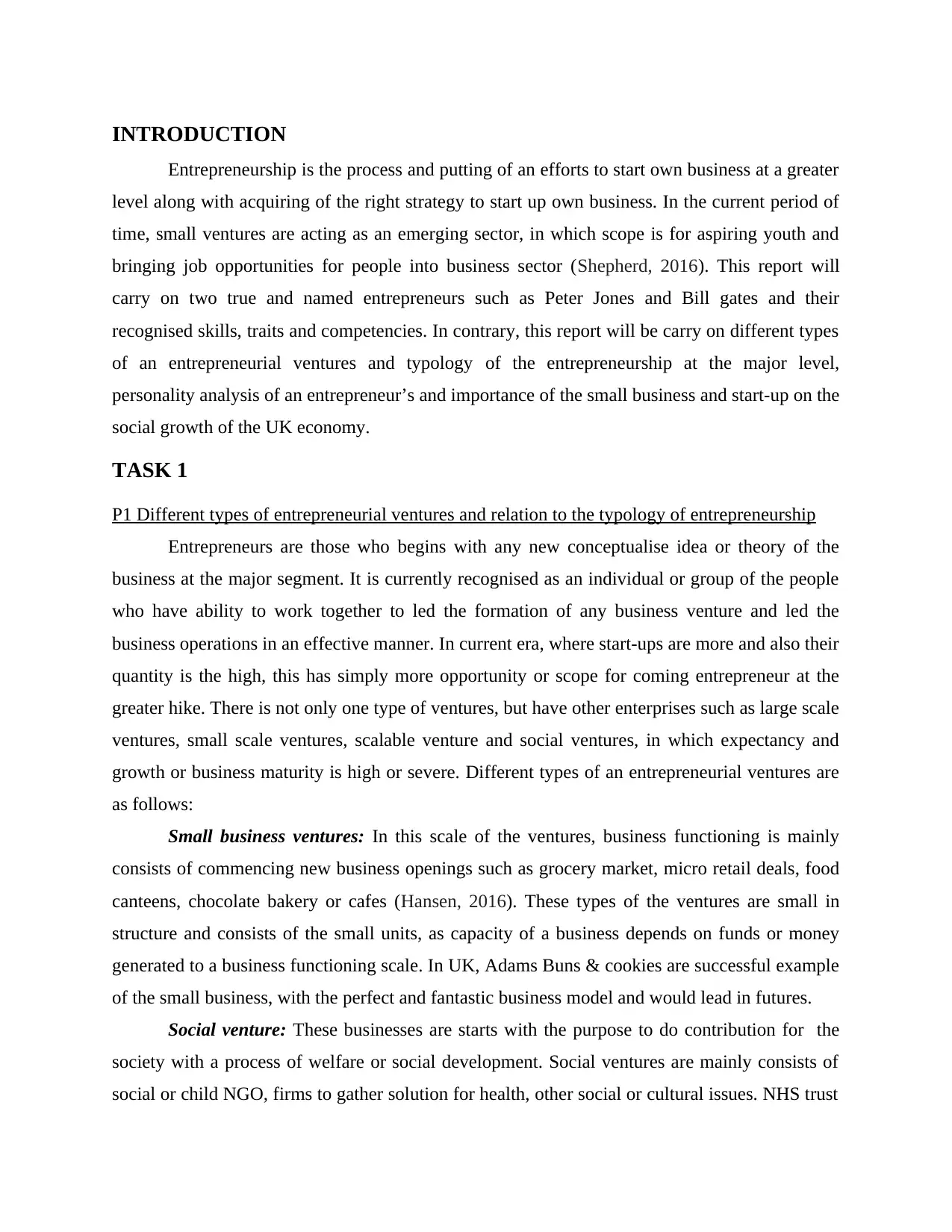
INTRODUCTION
Entrepreneurship is the process and putting of an efforts to start own business at a greater
level along with acquiring of the right strategy to start up own business. In the current period of
time, small ventures are acting as an emerging sector, in which scope is for aspiring youth and
bringing job opportunities for people into business sector (Shepherd, 2016). This report will
carry on two true and named entrepreneurs such as Peter Jones and Bill gates and their
recognised skills, traits and competencies. In contrary, this report will be carry on different types
of an entrepreneurial ventures and typology of the entrepreneurship at the major level,
personality analysis of an entrepreneur’s and importance of the small business and start-up on the
social growth of the UK economy.
TASK 1
P1 Different types of entrepreneurial ventures and relation to the typology of entrepreneurship
Entrepreneurs are those who begins with any new conceptualise idea or theory of the
business at the major segment. It is currently recognised as an individual or group of the people
who have ability to work together to led the formation of any business venture and led the
business operations in an effective manner. In current era, where start-ups are more and also their
quantity is the high, this has simply more opportunity or scope for coming entrepreneur at the
greater hike. There is not only one type of ventures, but have other enterprises such as large scale
ventures, small scale ventures, scalable venture and social ventures, in which expectancy and
growth or business maturity is high or severe. Different types of an entrepreneurial ventures are
as follows:
Small business ventures: In this scale of the ventures, business functioning is mainly
consists of commencing new business openings such as grocery market, micro retail deals, food
canteens, chocolate bakery or cafes (Hansen, 2016). These types of the ventures are small in
structure and consists of the small units, as capacity of a business depends on funds or money
generated to a business functioning scale. In UK, Adams Buns & cookies are successful example
of the small business, with the perfect and fantastic business model and would lead in futures.
Social venture: These businesses are starts with the purpose to do contribution for the
society with a process of welfare or social development. Social ventures are mainly consists of
social or child NGO, firms to gather solution for health, other social or cultural issues. NHS trust
Entrepreneurship is the process and putting of an efforts to start own business at a greater
level along with acquiring of the right strategy to start up own business. In the current period of
time, small ventures are acting as an emerging sector, in which scope is for aspiring youth and
bringing job opportunities for people into business sector (Shepherd, 2016). This report will
carry on two true and named entrepreneurs such as Peter Jones and Bill gates and their
recognised skills, traits and competencies. In contrary, this report will be carry on different types
of an entrepreneurial ventures and typology of the entrepreneurship at the major level,
personality analysis of an entrepreneur’s and importance of the small business and start-up on the
social growth of the UK economy.
TASK 1
P1 Different types of entrepreneurial ventures and relation to the typology of entrepreneurship
Entrepreneurs are those who begins with any new conceptualise idea or theory of the
business at the major segment. It is currently recognised as an individual or group of the people
who have ability to work together to led the formation of any business venture and led the
business operations in an effective manner. In current era, where start-ups are more and also their
quantity is the high, this has simply more opportunity or scope for coming entrepreneur at the
greater hike. There is not only one type of ventures, but have other enterprises such as large scale
ventures, small scale ventures, scalable venture and social ventures, in which expectancy and
growth or business maturity is high or severe. Different types of an entrepreneurial ventures are
as follows:
Small business ventures: In this scale of the ventures, business functioning is mainly
consists of commencing new business openings such as grocery market, micro retail deals, food
canteens, chocolate bakery or cafes (Hansen, 2016). These types of the ventures are small in
structure and consists of the small units, as capacity of a business depends on funds or money
generated to a business functioning scale. In UK, Adams Buns & cookies are successful example
of the small business, with the perfect and fantastic business model and would lead in futures.
Social venture: These businesses are starts with the purpose to do contribution for the
society with a process of welfare or social development. Social ventures are mainly consists of
social or child NGO, firms to gather solution for health, other social or cultural issues. NHS trust
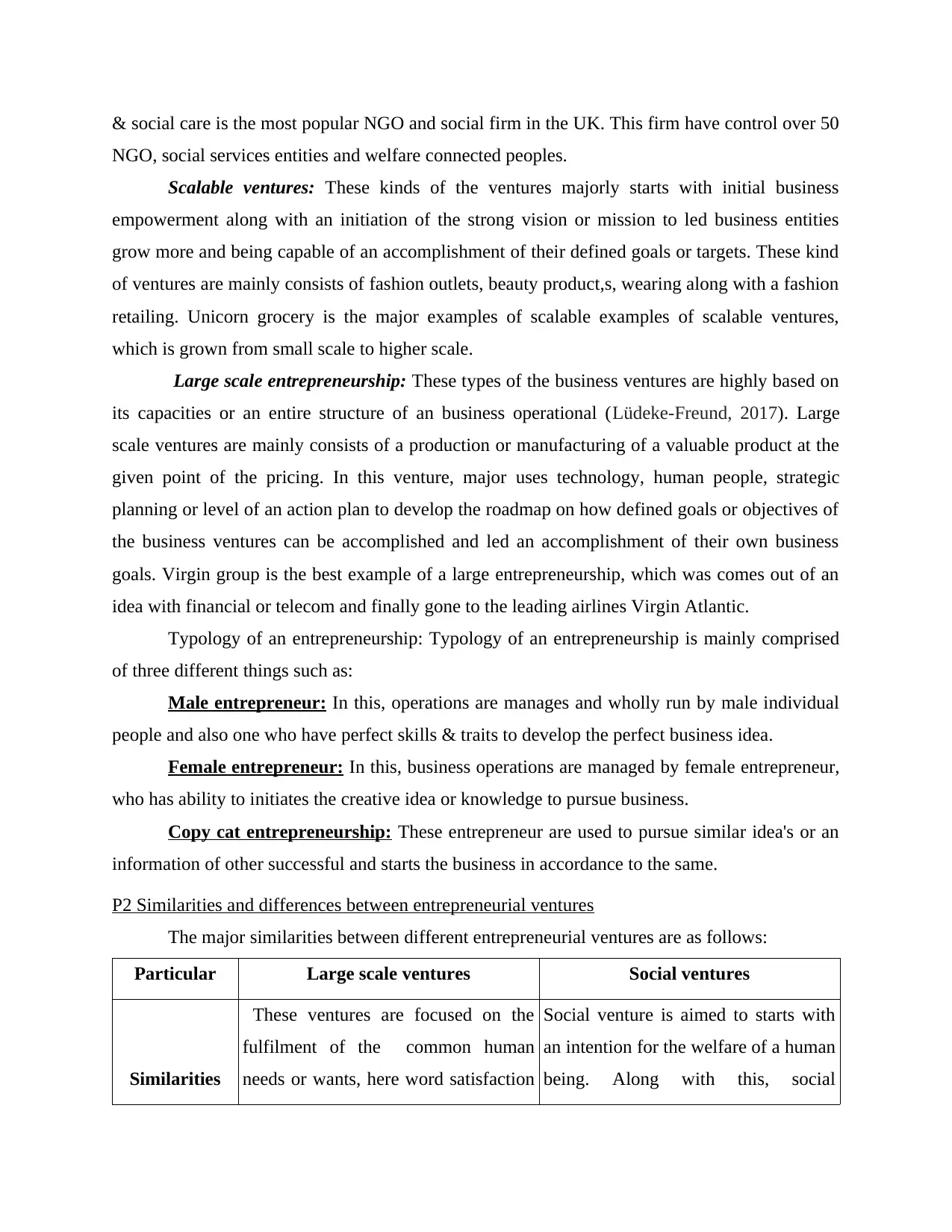
& social care is the most popular NGO and social firm in the UK. This firm have control over 50
NGO, social services entities and welfare connected peoples.
Scalable ventures: These kinds of the ventures majorly starts with initial business
empowerment along with an initiation of the strong vision or mission to led business entities
grow more and being capable of an accomplishment of their defined goals or targets. These kind
of ventures are mainly consists of fashion outlets, beauty product,s, wearing along with a fashion
retailing. Unicorn grocery is the major examples of scalable examples of scalable ventures,
which is grown from small scale to higher scale.
Large scale entrepreneurship: These types of the business ventures are highly based on
its capacities or an entire structure of an business operational (Lüdeke-Freund, 2017). Large
scale ventures are mainly consists of a production or manufacturing of a valuable product at the
given point of the pricing. In this venture, major uses technology, human people, strategic
planning or level of an action plan to develop the roadmap on how defined goals or objectives of
the business ventures can be accomplished and led an accomplishment of their own business
goals. Virgin group is the best example of a large entrepreneurship, which was comes out of an
idea with financial or telecom and finally gone to the leading airlines Virgin Atlantic.
Typology of an entrepreneurship: Typology of an entrepreneurship is mainly comprised
of three different things such as:
Male entrepreneur: In this, operations are manages and wholly run by male individual
people and also one who have perfect skills & traits to develop the perfect business idea.
Female entrepreneur: In this, business operations are managed by female entrepreneur,
who has ability to initiates the creative idea or knowledge to pursue business.
Copy cat entrepreneurship: These entrepreneur are used to pursue similar idea's or an
information of other successful and starts the business in accordance to the same.
P2 Similarities and differences between entrepreneurial ventures
The major similarities between different entrepreneurial ventures are as follows:
Particular Large scale ventures Social ventures
Similarities
These ventures are focused on the
fulfilment of the common human
needs or wants, here word satisfaction
Social venture is aimed to starts with
an intention for the welfare of a human
being. Along with this, social
NGO, social services entities and welfare connected peoples.
Scalable ventures: These kinds of the ventures majorly starts with initial business
empowerment along with an initiation of the strong vision or mission to led business entities
grow more and being capable of an accomplishment of their defined goals or targets. These kind
of ventures are mainly consists of fashion outlets, beauty product,s, wearing along with a fashion
retailing. Unicorn grocery is the major examples of scalable examples of scalable ventures,
which is grown from small scale to higher scale.
Large scale entrepreneurship: These types of the business ventures are highly based on
its capacities or an entire structure of an business operational (Lüdeke-Freund, 2017). Large
scale ventures are mainly consists of a production or manufacturing of a valuable product at the
given point of the pricing. In this venture, major uses technology, human people, strategic
planning or level of an action plan to develop the roadmap on how defined goals or objectives of
the business ventures can be accomplished and led an accomplishment of their own business
goals. Virgin group is the best example of a large entrepreneurship, which was comes out of an
idea with financial or telecom and finally gone to the leading airlines Virgin Atlantic.
Typology of an entrepreneurship: Typology of an entrepreneurship is mainly comprised
of three different things such as:
Male entrepreneur: In this, operations are manages and wholly run by male individual
people and also one who have perfect skills & traits to develop the perfect business idea.
Female entrepreneur: In this, business operations are managed by female entrepreneur,
who has ability to initiates the creative idea or knowledge to pursue business.
Copy cat entrepreneurship: These entrepreneur are used to pursue similar idea's or an
information of other successful and starts the business in accordance to the same.
P2 Similarities and differences between entrepreneurial ventures
The major similarities between different entrepreneurial ventures are as follows:
Particular Large scale ventures Social ventures
Similarities
These ventures are focused on the
fulfilment of the common human
needs or wants, here word satisfaction
Social venture is aimed to starts with
an intention for the welfare of a human
being. Along with this, social
Secure Best Marks with AI Grader
Need help grading? Try our AI Grader for instant feedback on your assignments.
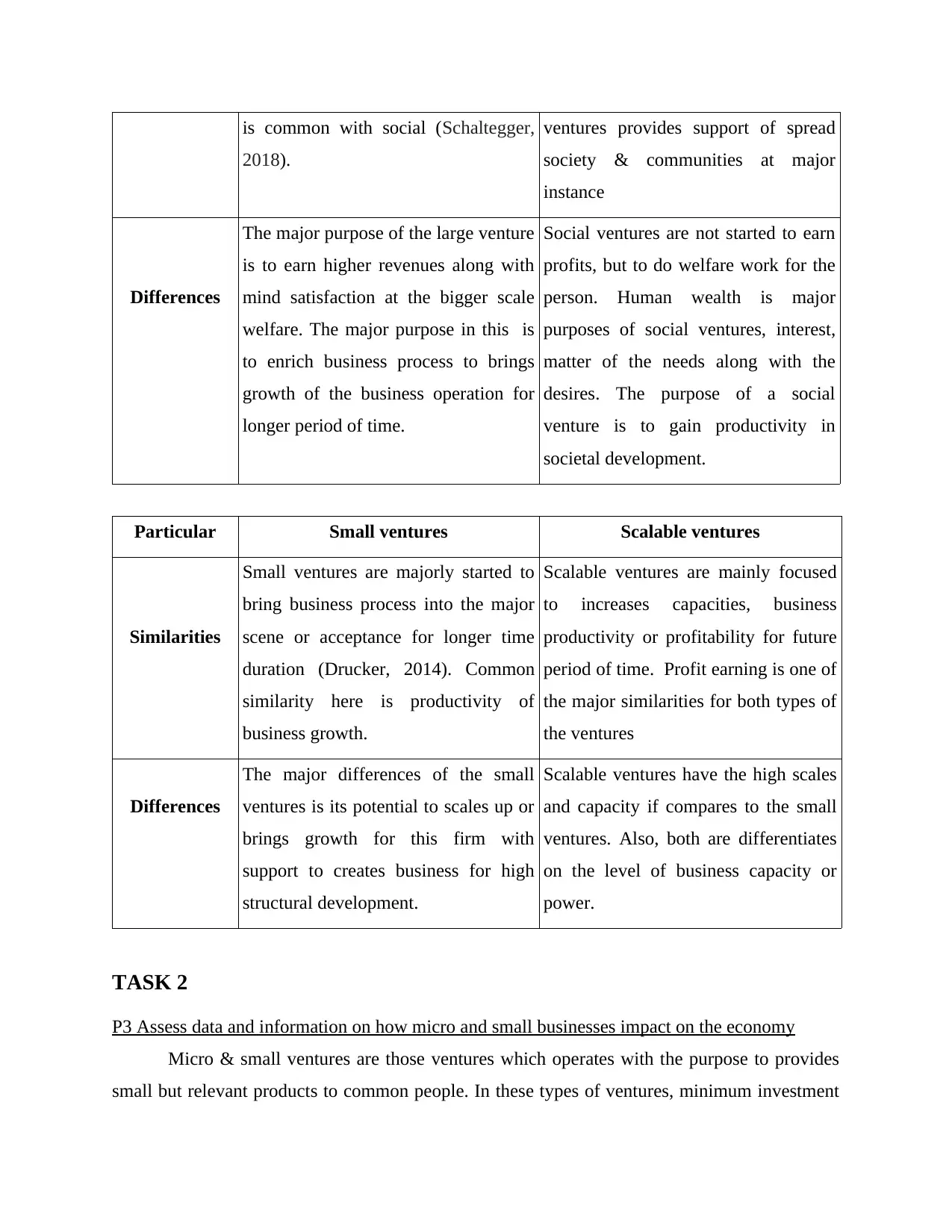
is common with social (Schaltegger,
2018).
ventures provides support of spread
society & communities at major
instance
Differences
The major purpose of the large venture
is to earn higher revenues along with
mind satisfaction at the bigger scale
welfare. The major purpose in this is
to enrich business process to brings
growth of the business operation for
longer period of time.
Social ventures are not started to earn
profits, but to do welfare work for the
person. Human wealth is major
purposes of social ventures, interest,
matter of the needs along with the
desires. The purpose of a social
venture is to gain productivity in
societal development.
Particular Small ventures Scalable ventures
Similarities
Small ventures are majorly started to
bring business process into the major
scene or acceptance for longer time
duration (Drucker, 2014). Common
similarity here is productivity of
business growth.
Scalable ventures are mainly focused
to increases capacities, business
productivity or profitability for future
period of time. Profit earning is one of
the major similarities for both types of
the ventures
Differences
The major differences of the small
ventures is its potential to scales up or
brings growth for this firm with
support to creates business for high
structural development.
Scalable ventures have the high scales
and capacity if compares to the small
ventures. Also, both are differentiates
on the level of business capacity or
power.
TASK 2
P3 Assess data and information on how micro and small businesses impact on the economy
Micro & small ventures are those ventures which operates with the purpose to provides
small but relevant products to common people. In these types of ventures, minimum investment
2018).
ventures provides support of spread
society & communities at major
instance
Differences
The major purpose of the large venture
is to earn higher revenues along with
mind satisfaction at the bigger scale
welfare. The major purpose in this is
to enrich business process to brings
growth of the business operation for
longer period of time.
Social ventures are not started to earn
profits, but to do welfare work for the
person. Human wealth is major
purposes of social ventures, interest,
matter of the needs along with the
desires. The purpose of a social
venture is to gain productivity in
societal development.
Particular Small ventures Scalable ventures
Similarities
Small ventures are majorly started to
bring business process into the major
scene or acceptance for longer time
duration (Drucker, 2014). Common
similarity here is productivity of
business growth.
Scalable ventures are mainly focused
to increases capacities, business
productivity or profitability for future
period of time. Profit earning is one of
the major similarities for both types of
the ventures
Differences
The major differences of the small
ventures is its potential to scales up or
brings growth for this firm with
support to creates business for high
structural development.
Scalable ventures have the high scales
and capacity if compares to the small
ventures. Also, both are differentiates
on the level of business capacity or
power.
TASK 2
P3 Assess data and information on how micro and small businesses impact on the economy
Micro & small ventures are those ventures which operates with the purpose to provides
small but relevant products to common people. In these types of ventures, minimum investment
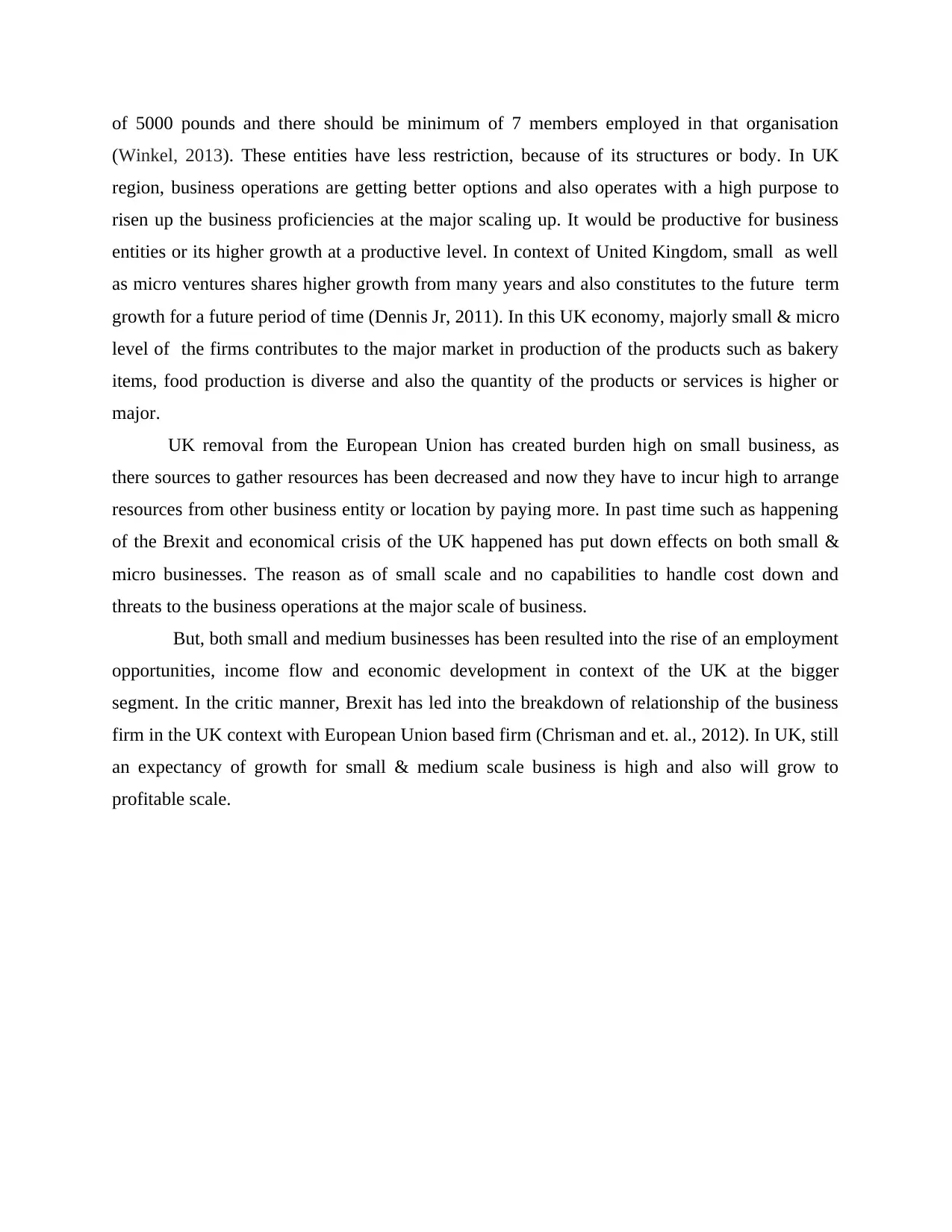
of 5000 pounds and there should be minimum of 7 members employed in that organisation
(Winkel, 2013). These entities have less restriction, because of its structures or body. In UK
region, business operations are getting better options and also operates with a high purpose to
risen up the business proficiencies at the major scaling up. It would be productive for business
entities or its higher growth at a productive level. In context of United Kingdom, small as well
as micro ventures shares higher growth from many years and also constitutes to the future term
growth for a future period of time (Dennis Jr, 2011). In this UK economy, majorly small & micro
level of the firms contributes to the major market in production of the products such as bakery
items, food production is diverse and also the quantity of the products or services is higher or
major.
UK removal from the European Union has created burden high on small business, as
there sources to gather resources has been decreased and now they have to incur high to arrange
resources from other business entity or location by paying more. In past time such as happening
of the Brexit and economical crisis of the UK happened has put down effects on both small &
micro businesses. The reason as of small scale and no capabilities to handle cost down and
threats to the business operations at the major scale of business.
But, both small and medium businesses has been resulted into the rise of an employment
opportunities, income flow and economic development in context of the UK at the bigger
segment. In the critic manner, Brexit has led into the breakdown of relationship of the business
firm in the UK context with European Union based firm (Chrisman and et. al., 2012). In UK, still
an expectancy of growth for small & medium scale business is high and also will grow to
profitable scale.
(Winkel, 2013). These entities have less restriction, because of its structures or body. In UK
region, business operations are getting better options and also operates with a high purpose to
risen up the business proficiencies at the major scaling up. It would be productive for business
entities or its higher growth at a productive level. In context of United Kingdom, small as well
as micro ventures shares higher growth from many years and also constitutes to the future term
growth for a future period of time (Dennis Jr, 2011). In this UK economy, majorly small & micro
level of the firms contributes to the major market in production of the products such as bakery
items, food production is diverse and also the quantity of the products or services is higher or
major.
UK removal from the European Union has created burden high on small business, as
there sources to gather resources has been decreased and now they have to incur high to arrange
resources from other business entity or location by paying more. In past time such as happening
of the Brexit and economical crisis of the UK happened has put down effects on both small &
micro businesses. The reason as of small scale and no capabilities to handle cost down and
threats to the business operations at the major scale of business.
But, both small and medium businesses has been resulted into the rise of an employment
opportunities, income flow and economic development in context of the UK at the bigger
segment. In the critic manner, Brexit has led into the breakdown of relationship of the business
firm in the UK context with European Union based firm (Chrisman and et. al., 2012). In UK, still
an expectancy of growth for small & medium scale business is high and also will grow to
profitable scale.
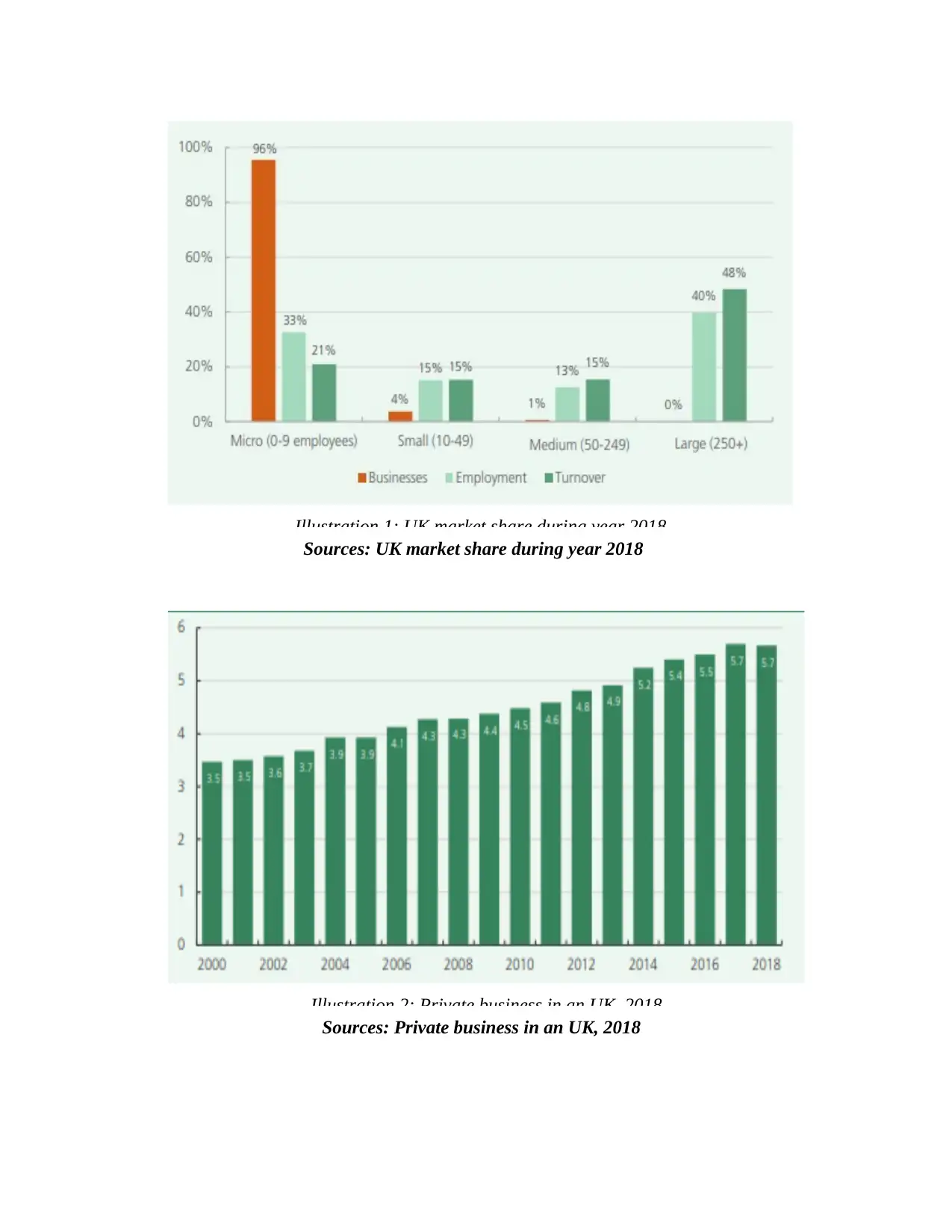
Illustration 1: UK market share during year 2018
Sources: UK market share during year 2018
Illustration 2: Private business in an UK, 2018
Sources: Private business in an UK, 2018
Sources: UK market share during year 2018
Illustration 2: Private business in an UK, 2018
Sources: Private business in an UK, 2018
Paraphrase This Document
Need a fresh take? Get an instant paraphrase of this document with our AI Paraphraser
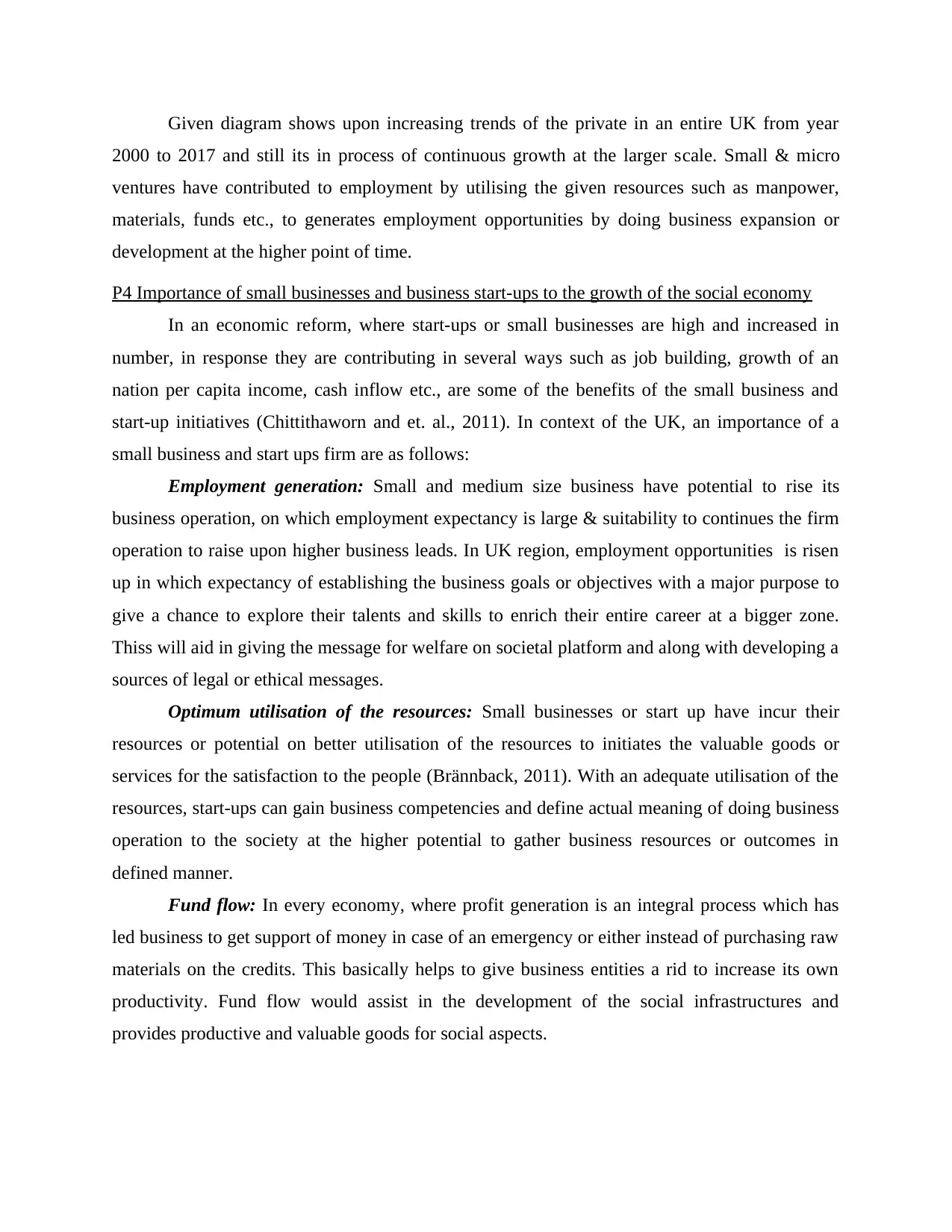
Given diagram shows upon increasing trends of the private in an entire UK from year
2000 to 2017 and still its in process of continuous growth at the larger scale. Small & micro
ventures have contributed to employment by utilising the given resources such as manpower,
materials, funds etc., to generates employment opportunities by doing business expansion or
development at the higher point of time.
P4 Importance of small businesses and business start-ups to the growth of the social economy
In an economic reform, where start-ups or small businesses are high and increased in
number, in response they are contributing in several ways such as job building, growth of an
nation per capita income, cash inflow etc., are some of the benefits of the small business and
start-up initiatives (Chittithaworn and et. al., 2011). In context of the UK, an importance of a
small business and start ups firm are as follows:
Employment generation: Small and medium size business have potential to rise its
business operation, on which employment expectancy is large & suitability to continues the firm
operation to raise upon higher business leads. In UK region, employment opportunities is risen
up in which expectancy of establishing the business goals or objectives with a major purpose to
give a chance to explore their talents and skills to enrich their entire career at a bigger zone.
Thiss will aid in giving the message for welfare on societal platform and along with developing a
sources of legal or ethical messages.
Optimum utilisation of the resources: Small businesses or start up have incur their
resources or potential on better utilisation of the resources to initiates the valuable goods or
services for the satisfaction to the people (Brännback, 2011). With an adequate utilisation of the
resources, start-ups can gain business competencies and define actual meaning of doing business
operation to the society at the higher potential to gather business resources or outcomes in
defined manner.
Fund flow: In every economy, where profit generation is an integral process which has
led business to get support of money in case of an emergency or either instead of purchasing raw
materials on the credits. This basically helps to give business entities a rid to increase its own
productivity. Fund flow would assist in the development of the social infrastructures and
provides productive and valuable goods for social aspects.
2000 to 2017 and still its in process of continuous growth at the larger scale. Small & micro
ventures have contributed to employment by utilising the given resources such as manpower,
materials, funds etc., to generates employment opportunities by doing business expansion or
development at the higher point of time.
P4 Importance of small businesses and business start-ups to the growth of the social economy
In an economic reform, where start-ups or small businesses are high and increased in
number, in response they are contributing in several ways such as job building, growth of an
nation per capita income, cash inflow etc., are some of the benefits of the small business and
start-up initiatives (Chittithaworn and et. al., 2011). In context of the UK, an importance of a
small business and start ups firm are as follows:
Employment generation: Small and medium size business have potential to rise its
business operation, on which employment expectancy is large & suitability to continues the firm
operation to raise upon higher business leads. In UK region, employment opportunities is risen
up in which expectancy of establishing the business goals or objectives with a major purpose to
give a chance to explore their talents and skills to enrich their entire career at a bigger zone.
Thiss will aid in giving the message for welfare on societal platform and along with developing a
sources of legal or ethical messages.
Optimum utilisation of the resources: Small businesses or start up have incur their
resources or potential on better utilisation of the resources to initiates the valuable goods or
services for the satisfaction to the people (Brännback, 2011). With an adequate utilisation of the
resources, start-ups can gain business competencies and define actual meaning of doing business
operation to the society at the higher potential to gather business resources or outcomes in
defined manner.
Fund flow: In every economy, where profit generation is an integral process which has
led business to get support of money in case of an emergency or either instead of purchasing raw
materials on the credits. This basically helps to give business entities a rid to increase its own
productivity. Fund flow would assist in the development of the social infrastructures and
provides productive and valuable goods for social aspects.
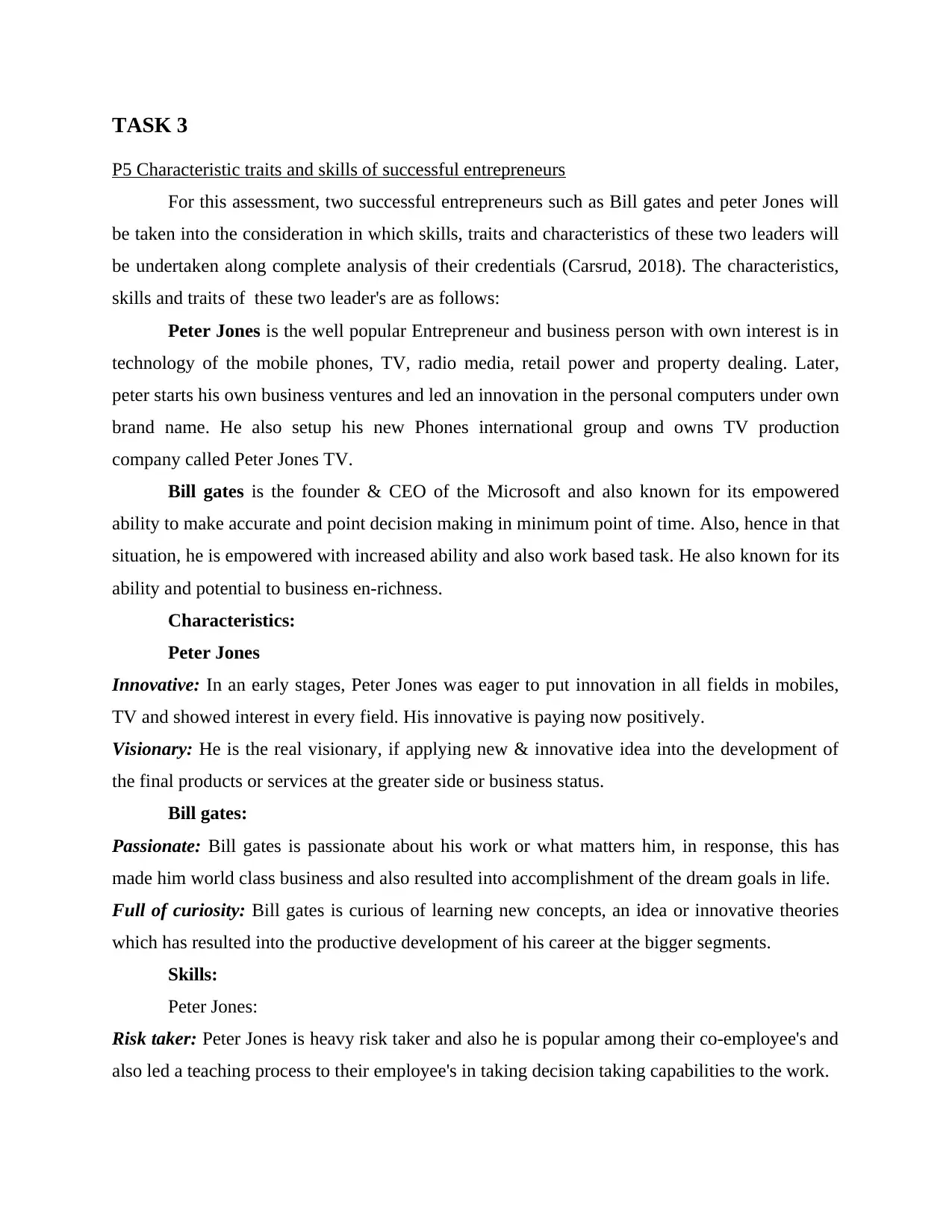
TASK 3
P5 Characteristic traits and skills of successful entrepreneurs
For this assessment, two successful entrepreneurs such as Bill gates and peter Jones will
be taken into the consideration in which skills, traits and characteristics of these two leaders will
be undertaken along complete analysis of their credentials (Carsrud, 2018). The characteristics,
skills and traits of these two leader's are as follows:
Peter Jones is the well popular Entrepreneur and business person with own interest is in
technology of the mobile phones, TV, radio media, retail power and property dealing. Later,
peter starts his own business ventures and led an innovation in the personal computers under own
brand name. He also setup his new Phones international group and owns TV production
company called Peter Jones TV.
Bill gates is the founder & CEO of the Microsoft and also known for its empowered
ability to make accurate and point decision making in minimum point of time. Also, hence in that
situation, he is empowered with increased ability and also work based task. He also known for its
ability and potential to business en-richness.
Characteristics:
Peter Jones
Innovative: In an early stages, Peter Jones was eager to put innovation in all fields in mobiles,
TV and showed interest in every field. His innovative is paying now positively.
Visionary: He is the real visionary, if applying new & innovative idea into the development of
the final products or services at the greater side or business status.
Bill gates:
Passionate: Bill gates is passionate about his work or what matters him, in response, this has
made him world class business and also resulted into accomplishment of the dream goals in life.
Full of curiosity: Bill gates is curious of learning new concepts, an idea or innovative theories
which has resulted into the productive development of his career at the bigger segments.
Skills:
Peter Jones:
Risk taker: Peter Jones is heavy risk taker and also he is popular among their co-employee's and
also led a teaching process to their employee's in taking decision taking capabilities to the work.
P5 Characteristic traits and skills of successful entrepreneurs
For this assessment, two successful entrepreneurs such as Bill gates and peter Jones will
be taken into the consideration in which skills, traits and characteristics of these two leaders will
be undertaken along complete analysis of their credentials (Carsrud, 2018). The characteristics,
skills and traits of these two leader's are as follows:
Peter Jones is the well popular Entrepreneur and business person with own interest is in
technology of the mobile phones, TV, radio media, retail power and property dealing. Later,
peter starts his own business ventures and led an innovation in the personal computers under own
brand name. He also setup his new Phones international group and owns TV production
company called Peter Jones TV.
Bill gates is the founder & CEO of the Microsoft and also known for its empowered
ability to make accurate and point decision making in minimum point of time. Also, hence in that
situation, he is empowered with increased ability and also work based task. He also known for its
ability and potential to business en-richness.
Characteristics:
Peter Jones
Innovative: In an early stages, Peter Jones was eager to put innovation in all fields in mobiles,
TV and showed interest in every field. His innovative is paying now positively.
Visionary: He is the real visionary, if applying new & innovative idea into the development of
the final products or services at the greater side or business status.
Bill gates:
Passionate: Bill gates is passionate about his work or what matters him, in response, this has
made him world class business and also resulted into accomplishment of the dream goals in life.
Full of curiosity: Bill gates is curious of learning new concepts, an idea or innovative theories
which has resulted into the productive development of his career at the bigger segments.
Skills:
Peter Jones:
Risk taker: Peter Jones is heavy risk taker and also he is popular among their co-employee's and
also led a teaching process to their employee's in taking decision taking capabilities to the work.
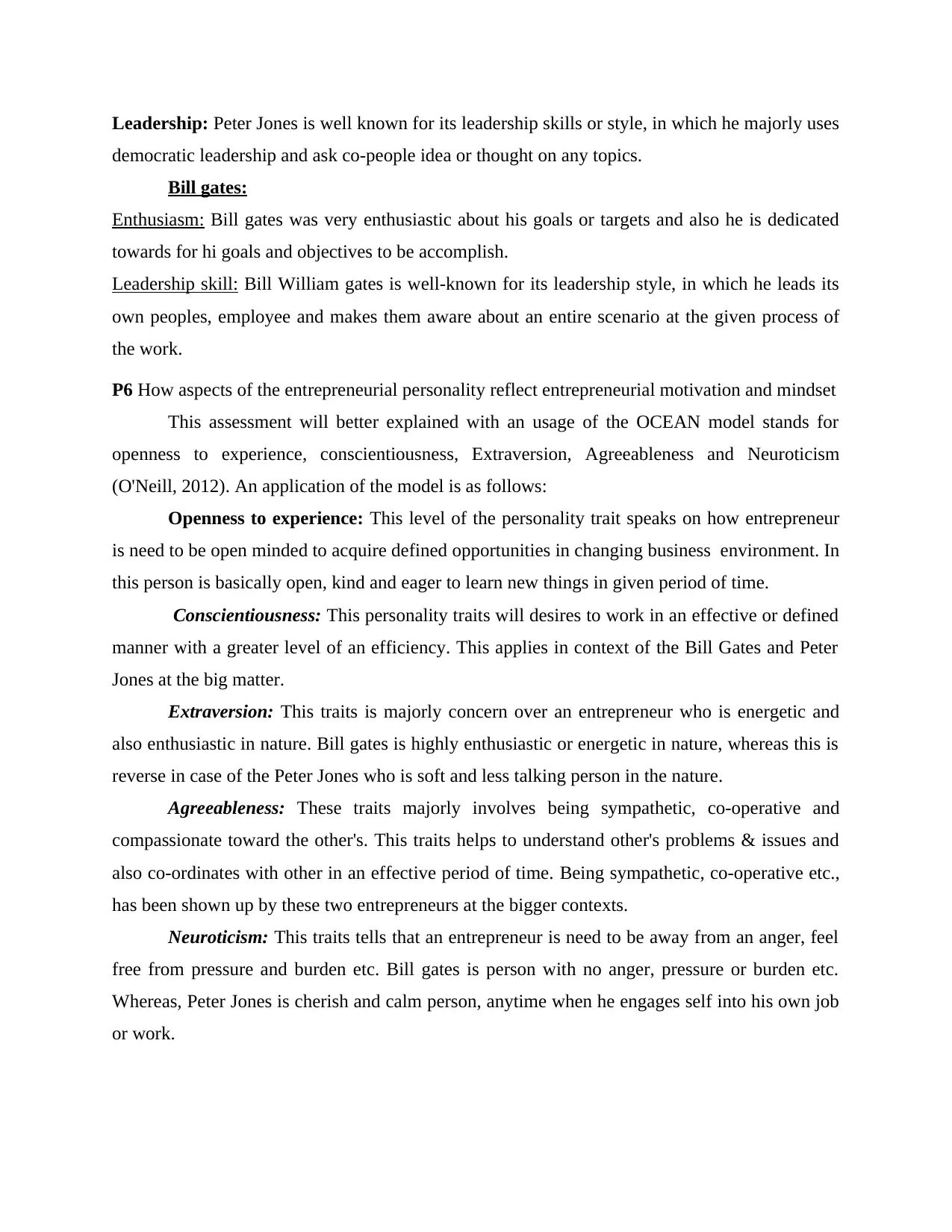
Leadership: Peter Jones is well known for its leadership skills or style, in which he majorly uses
democratic leadership and ask co-people idea or thought on any topics.
Bill gates:
Enthusiasm: Bill gates was very enthusiastic about his goals or targets and also he is dedicated
towards for hi goals and objectives to be accomplish.
Leadership skill: Bill William gates is well-known for its leadership style, in which he leads its
own peoples, employee and makes them aware about an entire scenario at the given process of
the work.
P6 How aspects of the entrepreneurial personality reflect entrepreneurial motivation and mindset
This assessment will better explained with an usage of the OCEAN model stands for
openness to experience, conscientiousness, Extraversion, Agreeableness and Neuroticism
(O'Neill, 2012). An application of the model is as follows:
Openness to experience: This level of the personality trait speaks on how entrepreneur
is need to be open minded to acquire defined opportunities in changing business environment. In
this person is basically open, kind and eager to learn new things in given period of time.
Conscientiousness: This personality traits will desires to work in an effective or defined
manner with a greater level of an efficiency. This applies in context of the Bill Gates and Peter
Jones at the big matter.
Extraversion: This traits is majorly concern over an entrepreneur who is energetic and
also enthusiastic in nature. Bill gates is highly enthusiastic or energetic in nature, whereas this is
reverse in case of the Peter Jones who is soft and less talking person in the nature.
Agreeableness: These traits majorly involves being sympathetic, co-operative and
compassionate toward the other's. This traits helps to understand other's problems & issues and
also co-ordinates with other in an effective period of time. Being sympathetic, co-operative etc.,
has been shown up by these two entrepreneurs at the bigger contexts.
Neuroticism: This traits tells that an entrepreneur is need to be away from an anger, feel
free from pressure and burden etc. Bill gates is person with no anger, pressure or burden etc.
Whereas, Peter Jones is cherish and calm person, anytime when he engages self into his own job
or work.
democratic leadership and ask co-people idea or thought on any topics.
Bill gates:
Enthusiasm: Bill gates was very enthusiastic about his goals or targets and also he is dedicated
towards for hi goals and objectives to be accomplish.
Leadership skill: Bill William gates is well-known for its leadership style, in which he leads its
own peoples, employee and makes them aware about an entire scenario at the given process of
the work.
P6 How aspects of the entrepreneurial personality reflect entrepreneurial motivation and mindset
This assessment will better explained with an usage of the OCEAN model stands for
openness to experience, conscientiousness, Extraversion, Agreeableness and Neuroticism
(O'Neill, 2012). An application of the model is as follows:
Openness to experience: This level of the personality trait speaks on how entrepreneur
is need to be open minded to acquire defined opportunities in changing business environment. In
this person is basically open, kind and eager to learn new things in given period of time.
Conscientiousness: This personality traits will desires to work in an effective or defined
manner with a greater level of an efficiency. This applies in context of the Bill Gates and Peter
Jones at the big matter.
Extraversion: This traits is majorly concern over an entrepreneur who is energetic and
also enthusiastic in nature. Bill gates is highly enthusiastic or energetic in nature, whereas this is
reverse in case of the Peter Jones who is soft and less talking person in the nature.
Agreeableness: These traits majorly involves being sympathetic, co-operative and
compassionate toward the other's. This traits helps to understand other's problems & issues and
also co-ordinates with other in an effective period of time. Being sympathetic, co-operative etc.,
has been shown up by these two entrepreneurs at the bigger contexts.
Neuroticism: This traits tells that an entrepreneur is need to be away from an anger, feel
free from pressure and burden etc. Bill gates is person with no anger, pressure or burden etc.
Whereas, Peter Jones is cherish and calm person, anytime when he engages self into his own job
or work.
Secure Best Marks with AI Grader
Need help grading? Try our AI Grader for instant feedback on your assignments.
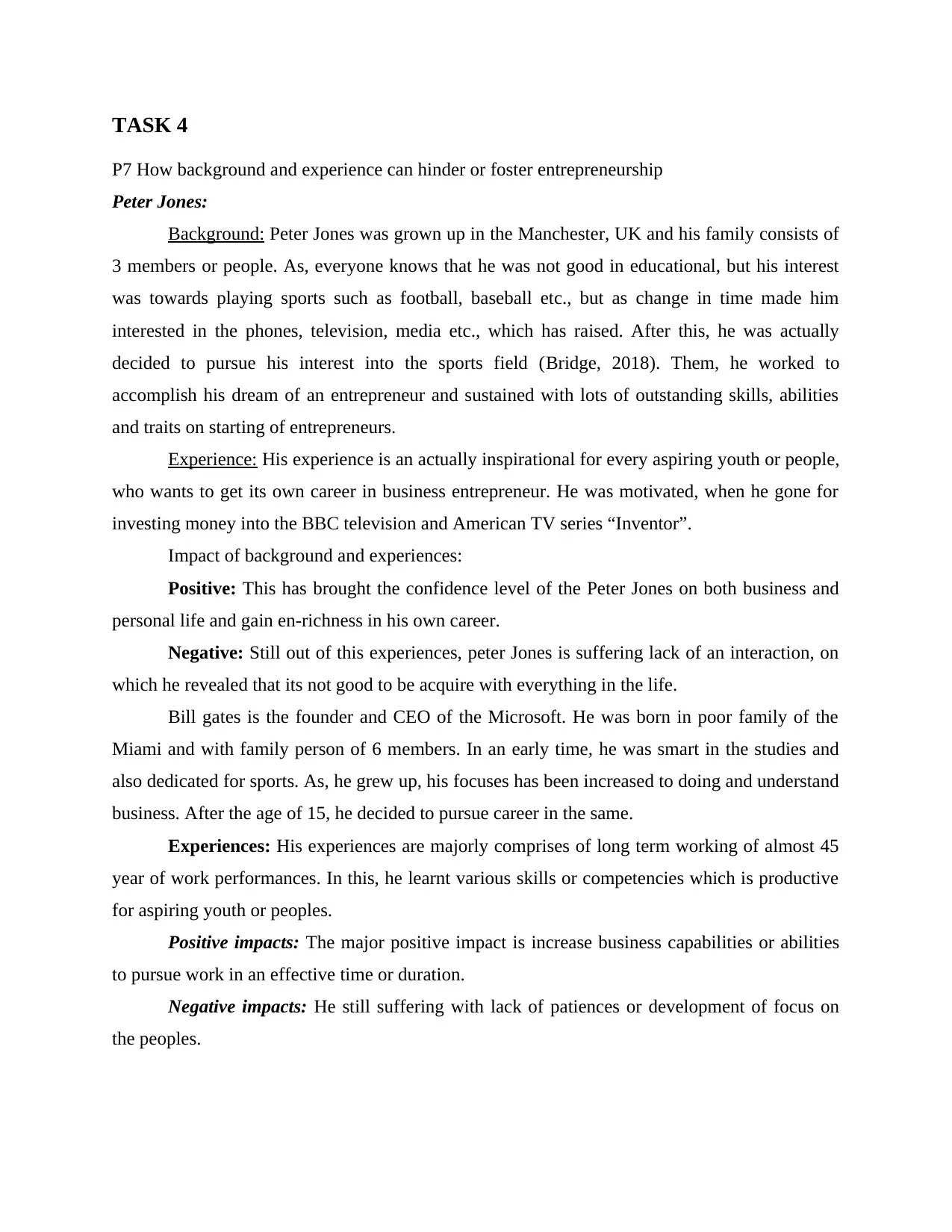
TASK 4
P7 How background and experience can hinder or foster entrepreneurship
Peter Jones:
Background: Peter Jones was grown up in the Manchester, UK and his family consists of
3 members or people. As, everyone knows that he was not good in educational, but his interest
was towards playing sports such as football, baseball etc., but as change in time made him
interested in the phones, television, media etc., which has raised. After this, he was actually
decided to pursue his interest into the sports field (Bridge, 2018). Them, he worked to
accomplish his dream of an entrepreneur and sustained with lots of outstanding skills, abilities
and traits on starting of entrepreneurs.
Experience: His experience is an actually inspirational for every aspiring youth or people,
who wants to get its own career in business entrepreneur. He was motivated, when he gone for
investing money into the BBC television and American TV series “Inventor”.
Impact of background and experiences:
Positive: This has brought the confidence level of the Peter Jones on both business and
personal life and gain en-richness in his own career.
Negative: Still out of this experiences, peter Jones is suffering lack of an interaction, on
which he revealed that its not good to be acquire with everything in the life.
Bill gates is the founder and CEO of the Microsoft. He was born in poor family of the
Miami and with family person of 6 members. In an early time, he was smart in the studies and
also dedicated for sports. As, he grew up, his focuses has been increased to doing and understand
business. After the age of 15, he decided to pursue career in the same.
Experiences: His experiences are majorly comprises of long term working of almost 45
year of work performances. In this, he learnt various skills or competencies which is productive
for aspiring youth or peoples.
Positive impacts: The major positive impact is increase business capabilities or abilities
to pursue work in an effective time or duration.
Negative impacts: He still suffering with lack of patiences or development of focus on
the peoples.
P7 How background and experience can hinder or foster entrepreneurship
Peter Jones:
Background: Peter Jones was grown up in the Manchester, UK and his family consists of
3 members or people. As, everyone knows that he was not good in educational, but his interest
was towards playing sports such as football, baseball etc., but as change in time made him
interested in the phones, television, media etc., which has raised. After this, he was actually
decided to pursue his interest into the sports field (Bridge, 2018). Them, he worked to
accomplish his dream of an entrepreneur and sustained with lots of outstanding skills, abilities
and traits on starting of entrepreneurs.
Experience: His experience is an actually inspirational for every aspiring youth or people,
who wants to get its own career in business entrepreneur. He was motivated, when he gone for
investing money into the BBC television and American TV series “Inventor”.
Impact of background and experiences:
Positive: This has brought the confidence level of the Peter Jones on both business and
personal life and gain en-richness in his own career.
Negative: Still out of this experiences, peter Jones is suffering lack of an interaction, on
which he revealed that its not good to be acquire with everything in the life.
Bill gates is the founder and CEO of the Microsoft. He was born in poor family of the
Miami and with family person of 6 members. In an early time, he was smart in the studies and
also dedicated for sports. As, he grew up, his focuses has been increased to doing and understand
business. After the age of 15, he decided to pursue career in the same.
Experiences: His experiences are majorly comprises of long term working of almost 45
year of work performances. In this, he learnt various skills or competencies which is productive
for aspiring youth or peoples.
Positive impacts: The major positive impact is increase business capabilities or abilities
to pursue work in an effective time or duration.
Negative impacts: He still suffering with lack of patiences or development of focus on
the peoples.
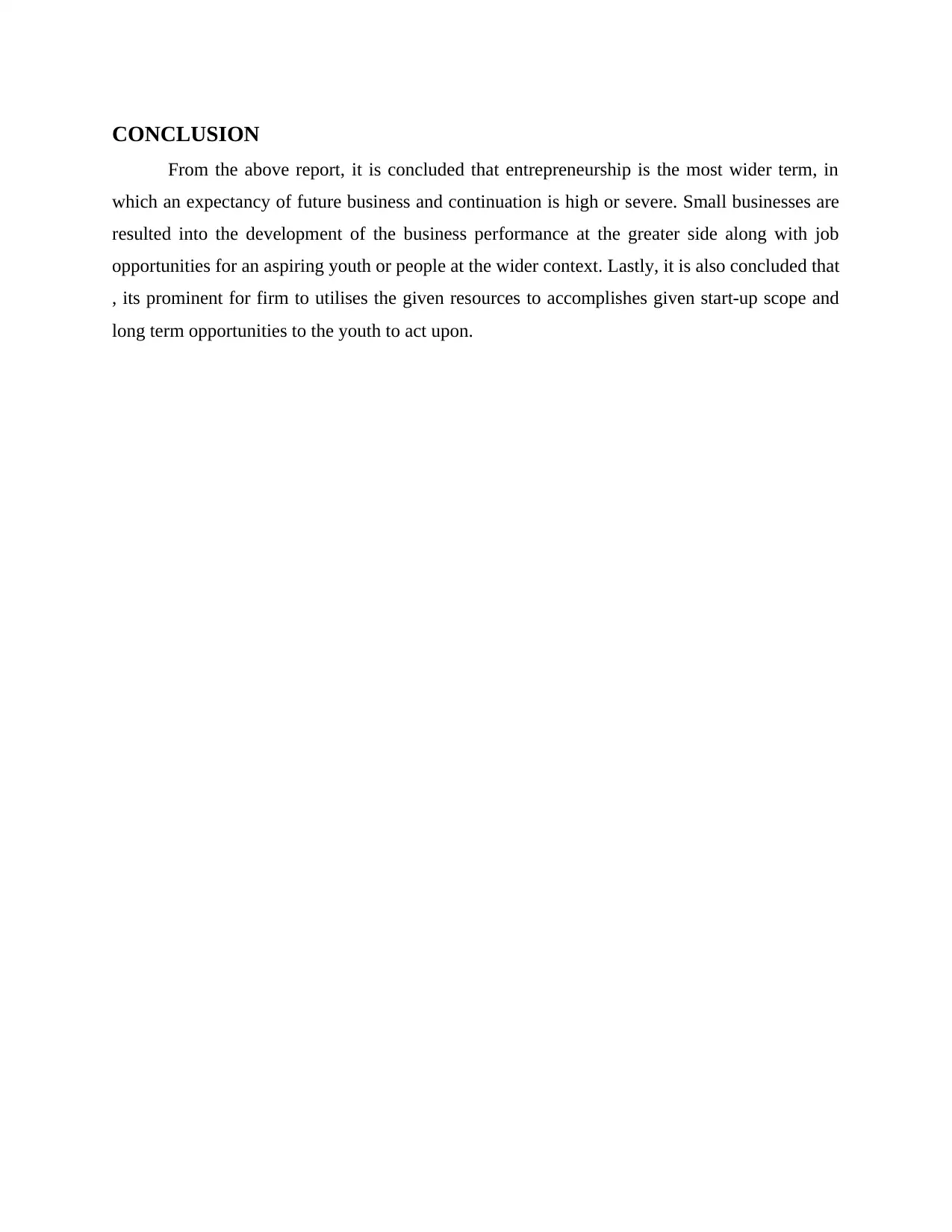
CONCLUSION
From the above report, it is concluded that entrepreneurship is the most wider term, in
which an expectancy of future business and continuation is high or severe. Small businesses are
resulted into the development of the business performance at the greater side along with job
opportunities for an aspiring youth or people at the wider context. Lastly, it is also concluded that
, its prominent for firm to utilises the given resources to accomplishes given start-up scope and
long term opportunities to the youth to act upon.
From the above report, it is concluded that entrepreneurship is the most wider term, in
which an expectancy of future business and continuation is high or severe. Small businesses are
resulted into the development of the business performance at the greater side along with job
opportunities for an aspiring youth or people at the wider context. Lastly, it is also concluded that
, its prominent for firm to utilises the given resources to accomplishes given start-up scope and
long term opportunities to the youth to act upon.
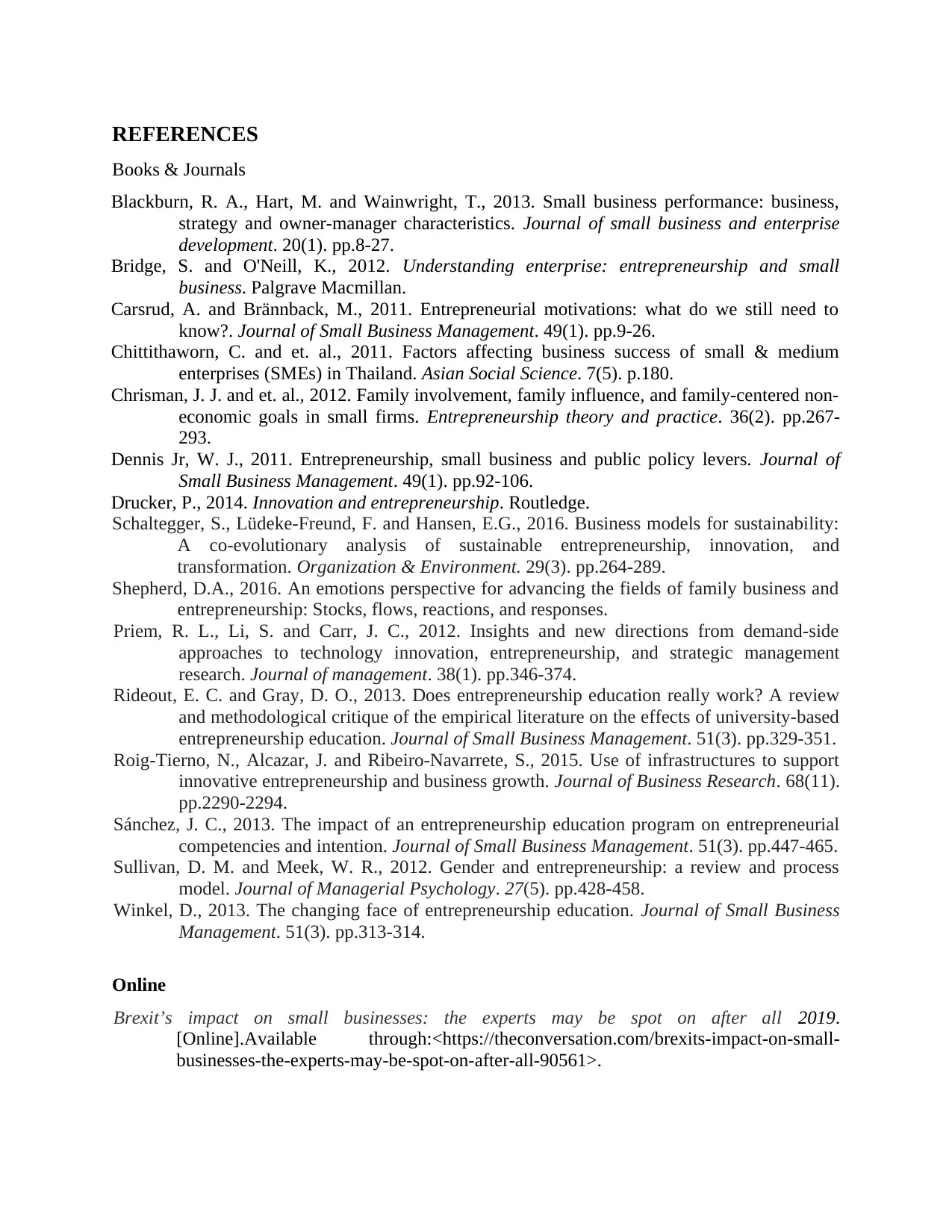
REFERENCES
Books & Journals
Blackburn, R. A., Hart, M. and Wainwright, T., 2013. Small business performance: business,
strategy and owner-manager characteristics. Journal of small business and enterprise
development. 20(1). pp.8-27.
Bridge, S. and O'Neill, K., 2012. Understanding enterprise: entrepreneurship and small
business. Palgrave Macmillan.
Carsrud, A. and Brännback, M., 2011. Entrepreneurial motivations: what do we still need to
know?. Journal of Small Business Management. 49(1). pp.9-26.
Chittithaworn, C. and et. al., 2011. Factors affecting business success of small & medium
enterprises (SMEs) in Thailand. Asian Social Science. 7(5). p.180.
Chrisman, J. J. and et. al., 2012. Family involvement, family influence, and family‐centered non‐
economic goals in small firms. Entrepreneurship theory and practice. 36(2). pp.267-
293.
Dennis Jr, W. J., 2011. Entrepreneurship, small business and public policy levers. Journal of
Small Business Management. 49(1). pp.92-106.
Drucker, P., 2014. Innovation and entrepreneurship. Routledge.
Schaltegger, S., Lüdeke-Freund, F. and Hansen, E.G., 2016. Business models for sustainability:
A co-evolutionary analysis of sustainable entrepreneurship, innovation, and
transformation. Organization & Environment. 29(3). pp.264-289.
Shepherd, D.A., 2016. An emotions perspective for advancing the fields of family business and
entrepreneurship: Stocks, flows, reactions, and responses.
Priem, R. L., Li, S. and Carr, J. C., 2012. Insights and new directions from demand-side
approaches to technology innovation, entrepreneurship, and strategic management
research. Journal of management. 38(1). pp.346-374.
Rideout, E. C. and Gray, D. O., 2013. Does entrepreneurship education really work? A review
and methodological critique of the empirical literature on the effects of university‐based
entrepreneurship education. Journal of Small Business Management. 51(3). pp.329-351.
Roig-Tierno, N., Alcazar, J. and Ribeiro-Navarrete, S., 2015. Use of infrastructures to support
innovative entrepreneurship and business growth. Journal of Business Research. 68(11).
pp.2290-2294.
Sánchez, J. C., 2013. The impact of an entrepreneurship education program on entrepreneurial
competencies and intention. Journal of Small Business Management. 51(3). pp.447-465.
Sullivan, D. M. and Meek, W. R., 2012. Gender and entrepreneurship: a review and process
model. Journal of Managerial Psychology. 27(5). pp.428-458.
Winkel, D., 2013. The changing face of entrepreneurship education. Journal of Small Business
Management. 51(3). pp.313-314.
Online
Brexit’s impact on small businesses: the experts may be spot on after all 2019.
[Online].Available through:<https://theconversation.com/brexits-impact-on-small-
businesses-the-experts-may-be-spot-on-after-all-90561>.
Books & Journals
Blackburn, R. A., Hart, M. and Wainwright, T., 2013. Small business performance: business,
strategy and owner-manager characteristics. Journal of small business and enterprise
development. 20(1). pp.8-27.
Bridge, S. and O'Neill, K., 2012. Understanding enterprise: entrepreneurship and small
business. Palgrave Macmillan.
Carsrud, A. and Brännback, M., 2011. Entrepreneurial motivations: what do we still need to
know?. Journal of Small Business Management. 49(1). pp.9-26.
Chittithaworn, C. and et. al., 2011. Factors affecting business success of small & medium
enterprises (SMEs) in Thailand. Asian Social Science. 7(5). p.180.
Chrisman, J. J. and et. al., 2012. Family involvement, family influence, and family‐centered non‐
economic goals in small firms. Entrepreneurship theory and practice. 36(2). pp.267-
293.
Dennis Jr, W. J., 2011. Entrepreneurship, small business and public policy levers. Journal of
Small Business Management. 49(1). pp.92-106.
Drucker, P., 2014. Innovation and entrepreneurship. Routledge.
Schaltegger, S., Lüdeke-Freund, F. and Hansen, E.G., 2016. Business models for sustainability:
A co-evolutionary analysis of sustainable entrepreneurship, innovation, and
transformation. Organization & Environment. 29(3). pp.264-289.
Shepherd, D.A., 2016. An emotions perspective for advancing the fields of family business and
entrepreneurship: Stocks, flows, reactions, and responses.
Priem, R. L., Li, S. and Carr, J. C., 2012. Insights and new directions from demand-side
approaches to technology innovation, entrepreneurship, and strategic management
research. Journal of management. 38(1). pp.346-374.
Rideout, E. C. and Gray, D. O., 2013. Does entrepreneurship education really work? A review
and methodological critique of the empirical literature on the effects of university‐based
entrepreneurship education. Journal of Small Business Management. 51(3). pp.329-351.
Roig-Tierno, N., Alcazar, J. and Ribeiro-Navarrete, S., 2015. Use of infrastructures to support
innovative entrepreneurship and business growth. Journal of Business Research. 68(11).
pp.2290-2294.
Sánchez, J. C., 2013. The impact of an entrepreneurship education program on entrepreneurial
competencies and intention. Journal of Small Business Management. 51(3). pp.447-465.
Sullivan, D. M. and Meek, W. R., 2012. Gender and entrepreneurship: a review and process
model. Journal of Managerial Psychology. 27(5). pp.428-458.
Winkel, D., 2013. The changing face of entrepreneurship education. Journal of Small Business
Management. 51(3). pp.313-314.
Online
Brexit’s impact on small businesses: the experts may be spot on after all 2019.
[Online].Available through:<https://theconversation.com/brexits-impact-on-small-
businesses-the-experts-may-be-spot-on-after-all-90561>.
1 out of 13
Related Documents
Your All-in-One AI-Powered Toolkit for Academic Success.
+13062052269
info@desklib.com
Available 24*7 on WhatsApp / Email
![[object Object]](/_next/static/media/star-bottom.7253800d.svg)
Unlock your academic potential
© 2024 | Zucol Services PVT LTD | All rights reserved.





